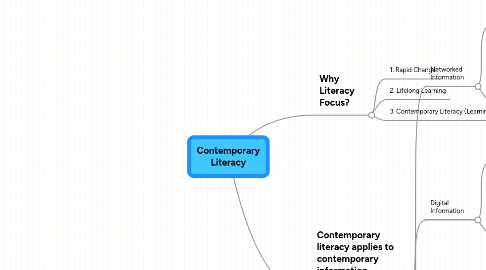Contemporary Literacy
por David Warlick


1. Why Literacy Focus?
1.1. 1. Rapid Change
1.2. 2. Lifelong Learning
1.3. 3. Contemporary Literacy (Learning Literacy) = Lifelong Learning
2. Contemporary literacy applies to contemporary information environment
2.1. Networked Information
2.1.1. Reading
2.1.2. Exposing What's True
2.1.2.1. Finding Information
2.1.2.2. Decoding Information
2.1.2.3. Evaluating Information
2.1.2.4. Understanding Information in Context
2.1.2.5. Web Links
2.2. Digital Information
2.2.1. Arithmetic
2.2.2. Employing the Information
2.2.2.1. Working with lots of numbers
2.2.2.2. Working with digital numbers
2.2.2.3. Working with digital (numbers) content
2.2.2.4. "Working the information"
2.2.2.5. Web Links
2.3. Abundant Information
2.3.1. Writing
2.3.2. Expressing Ideas Compellingly
2.3.2.1. Text
2.3.2.2. Images
2.3.2.3. Audio
2.3.2.4. Animation
2.3.2.5. Video
2.3.2.6. Web Links
2.4. Flows without Containers
2.4.1. Ethical Context
2.4.1.1. Info-Responsibility
2.4.1.2. Info-Property
2.4.1.3. Info-Infrastructure
2.4.1.4. Web Links
